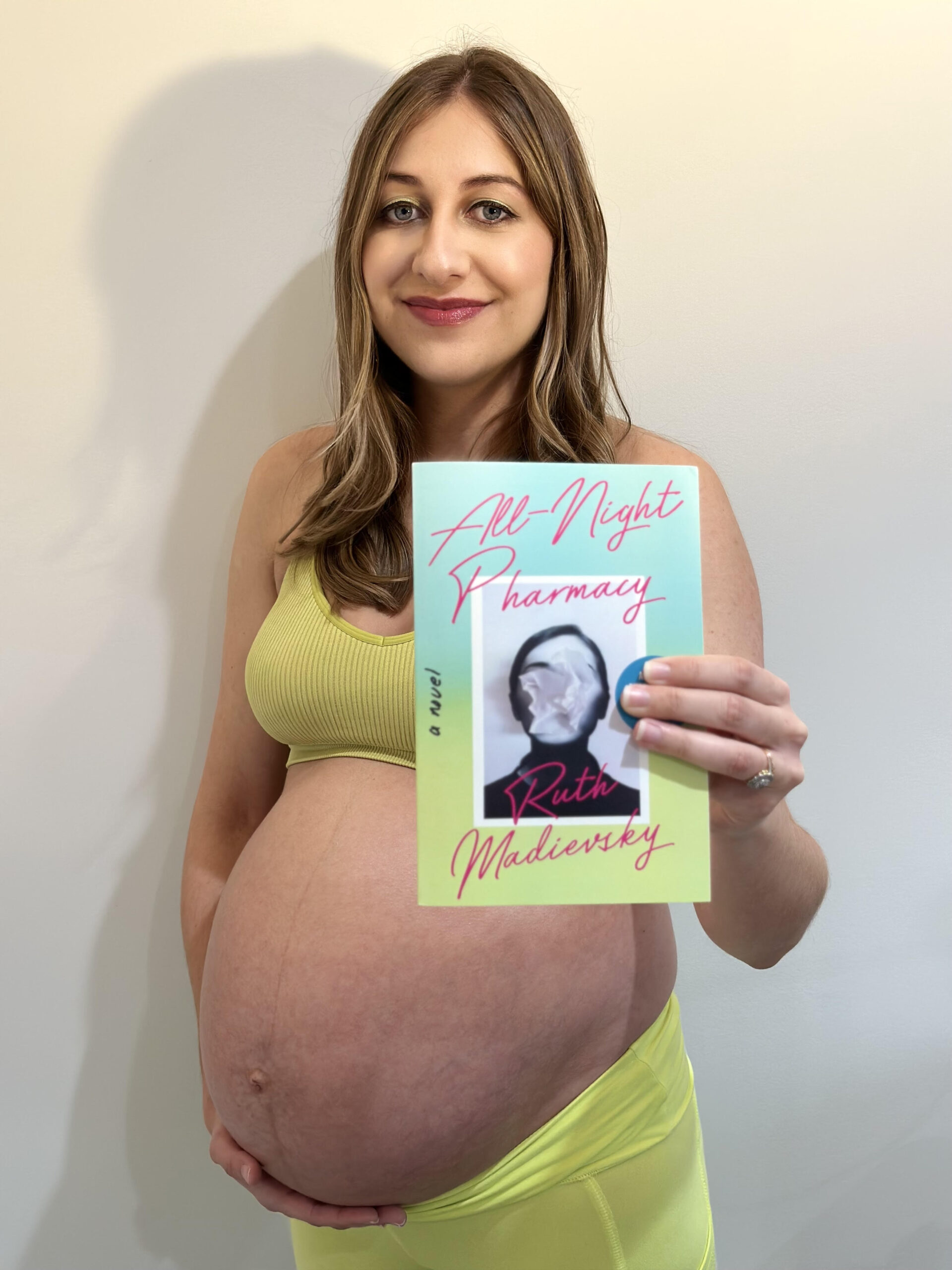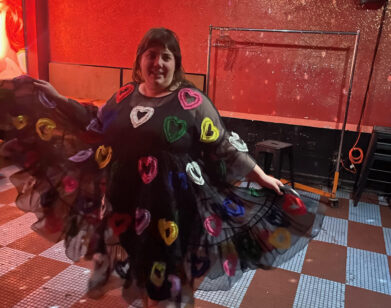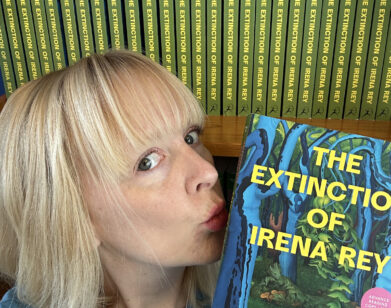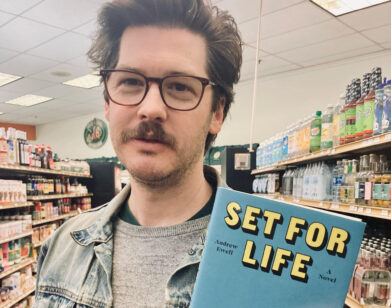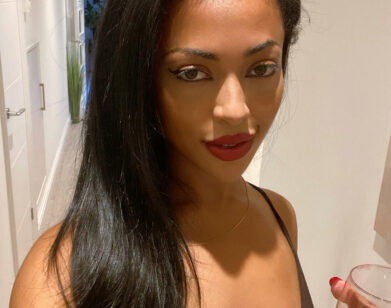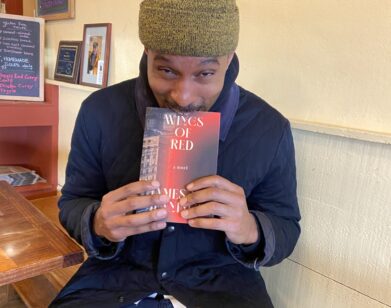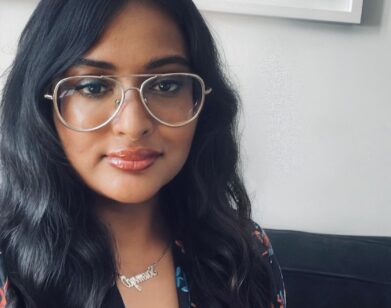OPEN BOOK
Ruth Madievsky Wants Readers to Post Nudes of Her New Novel
This is OPEN BOOK, a monthly column in which we ask debut authors about their reading and writing habits. Last month, we interviewed Emily Wells, who writes movingly about chronic illness in her memoir A Matter of Appearance. For this installment, we spoke with Ruth Madievsky, who, when she isn’t writing, works as a clinical pharmacist in Los Angeles. Madievsky’s first novel, All-Night Pharmacy, draws inspiration from her own life—it follows an unnamed narrator and her sister Debbie as they abuse prescription drugs and slink around seedy Los Angeles nightclubs. All-Night Pharmacy defies categorization—it begins as a investigation into Debbie’s disappearance but later transforms into a coming of age story, as the narrator’s search for her missing sister dovetails with her own journey of self-discovery. Though the novel tells a grim story, its darkness is tempered by Madievsky’s sharp wit. (In the first line of All-Night Pharmacy, the narrator compares spending time with her sister to an acid trip.) When she isn’t writing, dispensing prescriptions, or parenting her three-month-old, Madievsky takes her sense of humor to Twitter, where she posts dinosaur erotica and shares sex scenes that didn’t make the final draft of All-Night Pharmacy. Just before her book hits shelves, Madievsky took the time to answer our questionnaire, getting candid about the thrill of stripping off a dust jacket and what it would take to make her “self-deport back to Moldova.”
———
Where do you like to write?
Usually at my desk, which is nestled right next to my bookshelves. It feels important that any book I want to pluck is 2 steps away. I used to write in bed and on the couch, and then I turned 30 and my bones became glass.
When do you like to write?
I work full-time as an HIV and primary care clinical pharmacist and I just had a baby a few months ago, so I write literally anytime I can make it work. Sometimes that means typing on my phone with one hand while nursing at 3 am. My preference though is to write in the morning with a constant supply of tea so that, no matter what else happens that day, I know I’ve put in the work.
All-Night Pharmacy is set in Los Angeles. What’s your favorite L.A. novel?
Milk Fed by Melissa Broder! It follows 24-year-old Rachel as she navigates an erotic obsession with a young Orthodox Jewish woman who works at her local froyo shop. Rachel, who aspires to break out in LA’s stand-up comedy scene, visits the froyo shop on lunch breaks from her soul-crushing job at a talent management company. Milk Fed is hot, laugh-out-loud funny, queer, Jewish, and extremely L.A. At one point, Rachel describes an L.A. restaurant as having “a farm-to-hell look that always made me think of death by hanging.” I recently wrote about why I love Milk Fed for The Atlantic. It’s an unforgettable read.
What’s the first thing you did after you turned in a draft of your book?
Oh man, there were so many drafts. I kept adding in weird sexual commentary only to, at the gentle urging of my editor and agent, delete them one draft later. (RIP to that time I summarized the energy of a character in my novel as: “He wore the professional veneer of a man who hadn’t asked a woman he met two hours earlier to choke him with a dish rag.”). I have a hard time just vibing with the feeling that I’ve accomplished something. I’m always pivoting to the next goalpost. It was only when people around me reminded me that I’d done something worth slowing down and celebrating that I descended upon a dessert tray like a plague of locusts or bought something indulgent like a “silk revision robe.”
Tell us about three to five books you read while writing your own, and why?
Rufi Thorpe’s The Knockout Queen, Kimberly King Parsons’ Black Light, Ottessa Moshfegh’s Homesick for Another World, Lot by Bryan Washington, and Luster by Raven Leilani.
All of these books are incredible at the sentence level—I’ve underlined them within an inch of their lives. They capture the ecstasy and terror of being young with dark humor, piercing insight, and empathy. And nothing draws me in like a super voice-y narrator. “She requested that I put my hair back in a gross ponytail that made me look like I bred iguanas. But it made me look less gay,” says the narrator from Rufi Thorpe’s The Knockout Queen. I revised All-Night Pharmacy with the hope of writing a whole novel of sentences like that.
Tell us about a formative early reading experience.
Mary Gaitskill’s short story “The Other Place” rocked my fucking world when I heard Jennifer Egan read it on The New Yorker fiction podcast. It’s about a man who, in his youth, had disturbing sexual fantasies about hurting women, and now recognizes that same nascent desire in his teenage son. The story oscillates between the present-day narrator reckoning with the darkness within his son and a totally harrowing flashback in which the young narrator decides to hurt a woman for real. It’s a total nail-biter and unforgettable on the line level. The story opens with, “My son, Douglas, loves to play with toy guns. He is thirteen. He loves video games in which people get killed. He loves violence on TV, especially if it’s funny. How did this happen? The way everything does, of course. One thing follows another, naturally.” PHEW. Hooked from the get-go. When I find myself struggling with how to describe a character (hair color? Random detail like a chipped canine tooth?) I remember this classic Gaitskillian line: “He was middle-aged and fucked-up-looking, and my mom—we were stopped at a light—remarked that nobody in their right mind would pick him up.”
The last book you loved, and why?
Alina Pleskova’s debut poetry collection, Toska (Deep Vellum, 2023). As I wrote in my blurb, no one captures the poetics of eros and diasporic longing amid our late-stage capitalist hellscape like Alina Pleskova. A poem doesn’t have to be funny for me to love it, but dark humor is always, always welcome. The speaker of Toska spends her time “assuring various robots / that I’m not a robot several times daily.” I mean, same. I love a poem that captures with insane specificity how it feels to be alive today.
The last book that disappointed you, and why?
I’m too much of a people-pleaser to name it, but if you read literary fiction, you’ve no doubt heard of it. I can handle (and often love) dark shit, but when there’s zero joy to be found, what’s even the point? If I wanted to feel emotionally drawn and quartered from start to finish, I’d ask one of my relatives to describe their childhood in the former Soviet Union.
Hardcover or paperback? Why?
Hardcovers are great for supporting writers because they mean you nabbed that book early. And there’s something so sexy about getting to strip off a book’s dust jacket. I’ve been encouraging readers to post nudes of my novel.
A book you think should be in the canon, but isn’t:
Stay Up with Hugo Best by Erin Somers. The novel came out in 2019, so it’s a little early to declare its place in the canon. But I’m obsessed with how Somers captures a charged weekend in a young woman’s life with wit and humor and razor-sharp prose. The novel follows 29-year-old June, an assistant on a late-night comedy show, as she follows the show’s famous sixty-something-year-old host to his Greenwich mansion for Memorial Day weekend. Describing a wine, Somers writes, “It tasted woody, like someone had dragged some grapes along the deck of an old boat.” Describing the narrator: “Everywhere I caught glimpses of the person I could be if only I were a completely different person.” I loved every sentence of this novel.
A book you think shouldn’t be in the canon, but is:
What to Expect When You’re Expecting, haha. I skimmed it when I was in my first trimester and was really annoyed by the tone. It’s super heteronormative and full of cloying body-shaming “jokes” about how it’ll be a long time before your body is worth looking at again. The nutrition advice was so rigid and miserable. Sorry, but I would self-deport back to Moldova before exclusively eating salmon and broccoli and one shard of dark chocolate as a treat. Reading that book made pregnancy seem so punishing. Am I bringing new life into the world or atoning for my sins?
What’s your favorite bookstore(s)?
Skylight Books in Los Angeles is where I got engaged, am having my book launch, and have attended a million incredible author events. I’ve made lifelong writer friends at those events, either from attending their readings or vibing together in the audience. I kind of wish I had given birth there so that all my life’s biggest moments could have gone down under that glorious indoor ficus.
What do you look for in a reading experience?
I want to laugh and feel seen and stay up half the night until my eyes blur and my bladder is about to burst because I can’t stop reading. I want to underline a ton of sentences because of how they nail a particular voice. I want to feel bereft when the book is over and hate myself a little for not having written it myself. And, dream scenario: I want to feel the urge to write.
How do you arrange your bookshelf?
Alphabetically by genre (poetry, fiction, nonfiction, comics, anthology, and criticism) with separate sections for my to-read list, books I’ve annotated and want to transfer my underlinings to my notebook, and my own publications. At least in theory. I’m always running out of shelf space and end up shoving books in any nook and cranny that will take them. Which is why a limited-print-run poetry chapbook is currently resting atop an Ethiopian cookbook.

